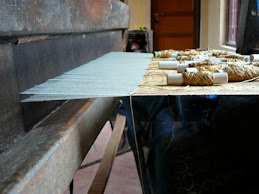In 1989 eight women entrepreneurs in Nepal who had formed an association known as WEAN – Women Entrepreneurs Association of Nepal, thought to provide training for women so that they might become entrepreneurs themselves. Twelve women who had some weaving experience were brought together to learn more about the traditional method of Dhaka weaving. However, in the initial interview of the women who would receive the training, each woman said, “Will I get a job at the conclusion?” The WEAN members had not really thought of this, their intention was to provide education not employment. The WEAN members held an emergency meeting and decided that following the training, each of them would invest some of their own money to create a production unit to preserve and promote Dhaka textile weaving. This enterprise would become Dhaka Weaves. The initial training was a great success. Today, nearly twenty years later, Dhaka Weaves produces very high quality hand woven Dhaka textiles. On average 40 weavers at a time are employed, bringing income into their families that might not be there without the opportunity provided by Dhaka Weaves.
Lindsay and I have had the pleasure of meeting the extraordinary women who had the vision, the persistence and the heart to initiate, maintain and care about Dhaka Weaves. They represent the spirit and the potential of a new Nepal. However, Nepal has had 15 different governments in the past 17 years. The Nepali Rupee is pegged to the Indian Rupee and the small struggling economy of Nepal is overwhelmed and directly affected by the high inflation experienced in the Indian economy and carries over into Nepal. Political instability had driven out most of the tourists (a major source of foreign currency), and daily life for the average Nepali has become increasingly difficult.
Writing for the Nepali Times on July 4th, 2008, Bihari K. Shrestha states:
The people are desperate for food, jobs, income, healthcare and education. They were promised these during the elections, but now that the politicians are comfortably ensconced, these issues are being ignored in the power plays. Whatever sense of collective accountability that appeared at election time has vanished into thin air.
In a letter to the editor in the July 3, 2008 Kathmandu Post, Sanu Kayastha writes:
The month of June 2008 observed 11 days as banda (strike) in the Kathmandu Valley. There were some official holidays and, of course Sundays and Saturdays too. Actually we had only 17 working days in the last month. There is no calculation as to what price the nation has to pay for these crippling bandas.
In and around these “strike” days Lindsay and I continue to meet with women entrepreneurs, leaders of various associations, and the people involved with Fair Trade who are working to increase and promote improved livelihoods for artisans. The practice of Fair Trade outlines a set of criteria and principles. We are working with Dhaka Weaves to complete an application for membership into the organization Fair Trade Group Nepal. Business in Nepal is often based on trust and relationships. Business can also be based on whom you know. In a rapidly shifting political landscape, the value of whom you know changes daily.
This is the environment business and enterprise is trying to move forward in. In spite of the difficulties, people are optimistic and patient. Challenges come in many forms and from many directions. I am inspired each day by the spirit and the potential of the women we are collaborating with. In order to move Dhaka Weaves onto solid ground, we are proposing a set of business systems and practices adapted to meet Dhaka Weaves specific needs. Day by day we are learning and sharing. Thanks again to each of you for your support and suggestions. Do you need some Dhaka?
Subscribe to:
Post Comments (Atom)




















No comments:
Post a Comment